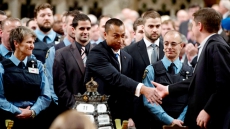OTTAWA — The Communications Security Establishment, Canada's electronic spy service, is set to play a more prominent role in the war against the Islamic State of Iraq and the Levant, The Canadian Press has learned.
Multiple sources familiar with the plans, speaking on condition of anonymity owing to the sensitivity of the matter, say the government is deploying a capability that only a "handful of countries" in the world can provide.
CSE is part of the so-called "Five Eyes" community, along with the U.S. National Security Agency — the NSA.
CSE spokesman Ryan Foreman acknowledged the agency is helping the Canadian Armed Forces under the umbrella of Operation Impact, the name of Canada's anti-ISIL mission in the Middle East, but refused to discuss specifics.
"While we are proud of our contributions to CAF's missions, CSE is obligated to respect the Security of Information Act, and cannot address specific operational questions," Foreman said.
Defence Minister Harjit Sajjan has for weeks been signalling that the military will introduce a "more robust" intelligence-gathering regime, one that allies — chastened by the withdrawal of the six CF-18s — are happy to be bring to the fight.
Separately, Public Safety Minister Ralph Goodale confirmed Thursday that the Canadian Security Intelligence Service will also play a stepped-up role in the fight against the Islamic State, but he also refused to be specific.
"We are providing new and additional intelligence capabilities in the region and while by its very nature I cannot elaborate, CSIS will have a role to play," Goodale said.
"It will certainly be an increased role to accomplish larger objectives."
The defence conference where Goodale and Sajjan were speaking heard Thursday about how CSIS agents cultivated human sources in Afghanistan.

But CSE played a pivotal role alongside the Canadian Army during the Afghan war, providing by its own admission half of the crucial battlefield intelligence on Taliban militants, their movements and the locations of key commanders.
The information was used to plan military operations and for targeted capture or kill missions by special forces. But one official, speaking on condition of anonymity, said Canadians would provide targeting only and not take part in any "direct action."
Although he's been eager to trumpet the "doubling" of the intelligence effort, Sajjan has been decidedly opaque about what that means, even last week when he announced the retooled mission.
"Enhanced intelligence capability will help protect our forces in theatre as well as those of our coalition and host nation partners," Sajjan said.
"Therefore, we will significantly increase the resources we dedicate to intelligence, both in northern Iraq and theatre-wide. Our intelligence capabilities will help the coalition and Iraqi security forces develop a more sophisticated picture of the threat and improve our ability to target, degrade and defeat ISIL."
What that likely means in practical terms, according to sources and intelligence experts, is the involvement of the secretive CSE and specialists from the 21st Electronic Warfare Regiment.
It also means deploying Canadian intelligence officers into the highly secure all-source intelligence centre in Kuwait, and potentially hacking ISIL computers and smartphones.
When pressed, Sajjan refused to discuss the details.

"Unfortunately, I'm not going to talk (about it) in public for operational security reasons," he said.
"The last thing you want to be able to do is show your hand to (ISIL) and let them know what type of capability you are bringing in, but we have very unique capabilities for the coalition, and what I will say is capabilities for theatre-wide for the entire coalition and then we have very specific capabilities for our troops in the north as well."
Bill Robinson, a blogger and expert on signals intelligence, said it is a matter of public record that the military and CSE have an integrated operational model for field operations, which proved highly successful in Afghanistan.
"It was a pretty substantial contribution on the intelligence side," said Robinson, who noted that signals kept watch over not only the movement of Taliban units and commanders, but also provided early warning of threats — such as the planting of roadside bombs — and even kept tabs on local Afghan government officials.
Deploying a similar capability to northern Iraq would, in Robinson's estimation, be a significant step-up in terms of the fight.
"It's a plausible argument that this is a contribution that would be valued just as much as the fighter-bombers," he said. "Increasingly, I think this kind of warfare is down to intelligence."
It is likely filling a gap that the Americans are unable to cover themselves, Robinson added.
Throughout the war against the Islamic State, U.S. commanders have repeatedly called for more intelligence data, mostly in the form of extra drone flights. Washington was forced to strip the remote-controlled aircraft from operations in Afghanistan, according to published reports.
Documents leaked by former NSA contractor Edward Snowden indicate "that in the Horn of Africa and Afghanistan, they were not getting all the signal intelligence they wanted," Robinson said.

That's one of the reasons Canada deployed its own capability to Kandahar during the war, he added.
The game could be upped even further with the purchase of special tactical intelligence surveillance planes, similar to the King Air turboprop aircraft used by special forces in Afghanistan under a contract with the U.S. Army. The federal government quietly floated a letter of interest in September to see if defence contractors could deliver three aircraft.
In addition, Robinson says Canadian intelligence officers are highly valued in multi-national intelligence hubs like the one in Kuwait, because they "are cleared into the Five Eyes community."





